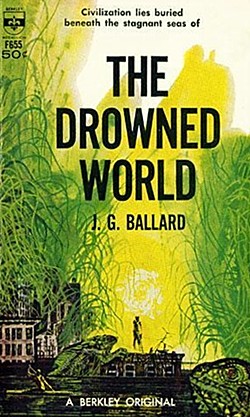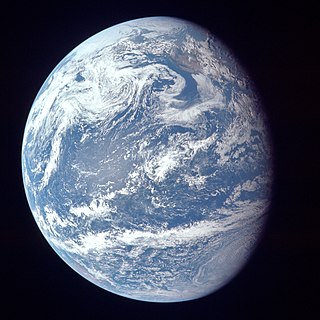Related Research Articles

James Graham Ballard was an English novelist and short story writer, satirist and essayist known for psychologically provocative works of fiction that explore the relations between human psychology, technology, sex and mass media. Ballard first became associated with New Wave science fiction for post-apocalyptic novels such as The Drowned World (1962), but later courted political controversy with the short-story collection The Atrocity Exhibition (1970), which includes the story "Why I Want to Fuck Ronald Reagan" (1968) and the novel Crash (1973), a story about car-crash fetishists.

The Gaia hypothesis, also known as the Gaia theory, Gaia paradigm, or the Gaia principle, proposes that living organisms interact with their inorganic surroundings on Earth to form a synergistic and self-regulating, complex system that helps to maintain and perpetuate the conditions for life on the planet.

The Crystal World is a science fiction novel by English author J. G. Ballard, published in 1966. The novel tells the story of a physician trying to make his way deep into the jungle to a secluded leprosy treatment facility. While trying to make it to his destination, his chaotic path leads him to try to come to terms with an apocalyptic phenomenon in the jungle that crystallises everything it touches.

The Wind from Nowhere is a science fiction novel by English author J. G. Ballard. Published in 1962, it was his debut novel. He had previously published only short stories.

The Burning World is a 1964 science fiction novel by British author J. G. Ballard. An expanded version, retitled The Drought, was first published in 1965 by Jonathan Cape.
An anoxic event describes a period wherein large expanses of Earth's oceans were depleted of dissolved oxygen (O2), creating toxic, euxinic (anoxic and sulfidic) waters. Although anoxic events have not happened for millions of years, the geologic record shows that they happened many times in the past. Anoxic events coincided with several mass extinctions and may have contributed to them. These mass extinctions include some that geobiologists use as time markers in biostratigraphic dating. On the other hand, there are widespread, various black-shale beds from the mid-Cretaceous which indicate anoxic events but are not associated with mass extinctions. Many geologists believe oceanic anoxic events are strongly linked to the slowing of ocean circulation, climatic warming, and elevated levels of greenhouse gases. Researchers have proposed enhanced volcanism (the release of CO2) as the "central external trigger for euxinia."

The Drowned World (1962), by J. G. Ballard, is a British science fiction novel that depicts a post-apocalyptic future in which global warming, caused by increased solar radiation, has rendered uninhabitable much of the surface of planet Earth. The story follows a team of scientists who are researching the environmental developments occurred in the flooded city of London. The novel is an expansion of the novella "The Drowned World", which was first published in Science Fiction Adventures magazine, in the January 1962 issue, Vol. 4, No. 24.

The Great Oxidation Event (GOE) or Great Oxygenation Event, also called the Oxygen Catastrophe, Oxygen Revolution, Oxygen Crisis or Oxygen Holocaust, was a time interval during the Early Earth's Paleoproterozoic era when the Earth's atmosphere and the shallow ocean first experienced a rise in the concentration of oxygen. This began approximately 2.460–2.426 Ga (billion years) ago during the Siderian period and ended approximately 2.060 Ga ago during the Rhyacian. Geological, isotopic, and chemical evidence suggests that biologically produced molecular oxygen (dioxygen or O2) started to accumulate in Earth's atmosphere and changed it from a weakly reducing atmosphere practically devoid of oxygen into an oxidizing one containing abundant free oxygen, with oxygen levels being as high as 10% of their present atmospheric level by the end of the GOE.
"The Voices of Time" is a dystopian science fiction short story by British author J. G. Ballard. It was first published in the October 1960 edition of New Worlds, and later in the 1962 collection The Voices of Time and Other Stories. It is an early example of the Inner Space type of story which drove the New Wave movement in the 1960s. Its primary theme is one which was common in the New Wave, that of entropy and the breakdown of all things.

An ocean world, ocean planet or water world is a type of planet that contains a substantial amount of water in the form of oceans, as part of its hydrosphere, either beneath the surface, as subsurface oceans, or on the surface, potentially submerging all dry land. The term ocean world is also used sometimes for astronomical bodies with an ocean composed of a different fluid or thalassogen, such as lava, ammonia or hydrocarbons. The study of extraterrestrial oceans is referred to as planetary oceanography.
An extreme environment is a habitat that is considered very hard to survive in due to its considerably extreme conditions such as temperature, accessibility to different energy sources or under high pressure. For an area to be considered an extreme environment, it must contain certain conditions and aspects that are considered very hard for other life forms to survive. Pressure conditions may be extremely high or low; high or low content of oxygen or carbon dioxide in the atmosphere; high levels of radiation, acidity, or alkalinity; absence of water; water containing a high concentration of salt; the presence of sulphur, petroleum, and other toxic substances.
"The Concentration City" is a dystopian short story by British author J. G. Ballard, first published, under the title "Build-Up", in New Worlds volume 19 number 55 in January 1957. It was reprinted in the collections Billennium and Chronopolis and later, under its revised title, in The Disaster Area and was also included in The Complete Short Stories of J. G. Ballard: Volume 1 and The Complete Stories of J.G. Ballard.
"Track 12" is a short story by British author J. G. Ballard, it first appeared in the April 1958 edition of New Worlds. It then appeared in Penguin Science Fiction in 1961, Passport to Eternity, The Venus Hunters, The Overloaded Man, and later in The Complete Short Stories of J. G. Ballard: Volume 1.
The Complete Short Stories of J. G. Ballard: Volume 2 is a short story collection by J. G. Ballard, published in 2006.
"Zone of Terror" is a short story by British author J. G. Ballard, first appearing in the March 1960 edition of New Worlds. It later appeared in the 1962 collection The Voices of Time and Other Stories, in The Disaster Area (1967) and The Complete Short Stories of J. G. Ballard: Volume 1 (2006).

The ocean is the body of salt water that covers ~70.8% of the Earth. In English, the term ocean also refers to any of the large bodies of water into which the world ocean is conventionally divided. Distinct names are used to identify five different areas of the ocean: Pacific, Atlantic, Indian, Antarctic/Southern, and Arctic. The ocean contains 97% of Earth's water and is the primary component of the Earth's hydrosphere, thus the ocean is essential to life on Earth. The ocean influences climate and weather patterns, the carbon cycle, and the water cycle by acting as a huge heat reservoir.
"Minus One" is a short story by British author J. G. Ballard; it was first published in the June 1963 edition of Science Fantasy. It was later reprinted in the 1967 collection The Disaster Area, and then later in the larger The Complete Short Stories of J. G. Ballard: Volume 1 anthology (2006).

The biological and geological future of Earth can be extrapolated based on the estimated effects of several long-term influences. These include the chemistry at Earth's surface, the cooling rate of the planet's interior, the gravitational interactions with other objects in the Solar System, and a steady increase in the Sun's luminosity. An uncertain factor is the pervasive influence of technology introduced by humans, such as climate engineering, which could cause significant changes to the planet. For example, the current Holocene extinction is being caused by technology, and the effects may last for up to five million years. In turn, technology may result in the extinction of humanity, leaving the planet to gradually return to a slower evolutionary pace resulting solely from long-term natural processes.
Aftermath is a 2010 Canadian-American documentary television series created by History Canada and produced by Cream Productions. It aired on National Geographic in the United States.

Chronopolis and Other Stories is a 1971 collection of science fiction stories by British writer J. G. Ballard. Originally published in the United States by Putnam, it was reprinted in paperback in 1972 by Berkley Books, under the title Chronopolis, subtitled "The Science Fiction of J. G. Ballard."
References
- ↑ "JG Ballard Book Cover Scans: 1960-61". The Terminal Collection. Retrieved January 6, 2009.[ dead link ]
- ↑ "JG Ballard Book Cover Scans: 1962-63". The Terminal Collection. Retrieved January 6, 2009.